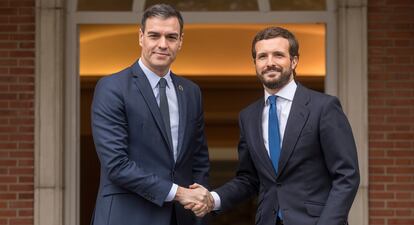Spanish PM, opposition chief hold meeting but find no common ground
Pedro Sánchez needs the support of Popular Party leader Pablo Casado if he is to make changes to several key institutions, including the judiciary watchdog and the Constitutional Court

A meeting on Monday between Spanish Prime Minister Pedro Sánchez and the head of the conservative Popular Party (PP), Pablo Casado, concluded with no advances. Via a statement, the executive stated after the encounter that “the PP has not changed any of its positions, despite its responsibility as the main opposition party, and is still adopting a strategy of deadlock.”
Sánchez was voted back into power by Spain’s lower house of parliament, the Congress of Deputies, in January. The Socialist Party (PSOE) politician won both the April 2019 general election and the repeat polls held in November of the same year, but on both occasions fell short of an absolute majority. Sánchez has since formed a coalition government with left-wing group Unidas Podemos, but still needs the support of other parties in Congress to pass legislation and to make changes to several key Spanish institutions.
There was no common ground on Monday, with Casado calling on the prime minister to do U-turns on nearly all of his initiatives
The government explained that the meeting was called by Sánchez in order to try to reach deals with the leader of the opposition. “A strong democracy is one where there is dialogue,” the prime minister said on Saturday during his party’s Federal Committee meeting. “We need everyone. Including the opposition, starting with the Popular Party, to whom we will once again offer our hand so that they join the territorial and social dialogue.”
But there was no common ground between the two politicians on Monday, with Casado calling on the prime minister to do U-turns on nearly all of his initiatives. The PP chief wants the government to abandon its plan to hold talks with the Catalan government about the future of the region, something that was a key commitment by the PSOE in order to secure the essential abstention of the pro-independence Catalan Republican Left (ERC) party at Sánchez’s January investiture vote.
“I proposed to Sánchez that we move forward in order to achieve order and social harmony in Catalonia with the criminalization of illegal referendums, fighting indoctrination, and avoiding public propaganda,” he said, in reference to the ongoing independence drive in Catalonia that reached its peak with an illegal vote on secession from Spain in October 2017 and a subsequent declaration of independence passed by the Catalan parliament later that same month.
Casado also wants the PSOE-Unidas Podemos government to scrap its plans to make changes to sedition laws in Spain’s Criminal Code. Nine of the pro-independence leaders tried by the Supreme Court over their role in the events of 2017 were found guilty of sedition and given lengthy prison sentences.
Sánchez can choose between those who want to make Spaniards poorer or try to reach deals with those of us who are proposing a commitment to SpainPablo Casado
Casado also called on Sánchez to choose an alternative candidate for prosecutor general in place of Sánchez’s controversial pick, former Justice Minister Dolores Delgado, and to commit to not raising taxes. Most of these measures would put the PSOE-Unidas Podemos coalition deal at risk. “The ball is in Sánchez’s court,” Casado said on Monday. “He can choose between those who want to make Spaniards poorer, or try to reach deals with those of us who are proposing a commitment to Spain.”
After the failure of Monday’s meeting, government sources stated that there will now be no chance of making changes to institutional bodies such as Spain’s legal watchdog, the CGPJ; the Audit Court, the Constitutional Court and the Ombudsman. To do so he would need the support of three-fifths of Congress, meaning that the backing of the PP is essential. The board of state broadcaster RTVE is also pending approval, which would require an absolute majority at a second round of voting in Congress.
The last time that Sánchez and Casado held a meeting was on September 12, 2019. At the time, the former was still the acting prime minister and met with the latter in a bid to seek the PP’s support at his investiture vote. The result was a meeting of barely 30 minutes, and an increase of the distance between the two politicians.
English version by Simon Hunter.
Tu suscripción se está usando en otro dispositivo
¿Quieres añadir otro usuario a tu suscripción?
Si continúas leyendo en este dispositivo, no se podrá leer en el otro.
FlechaTu suscripción se está usando en otro dispositivo y solo puedes acceder a EL PAÍS desde un dispositivo a la vez.
Si quieres compartir tu cuenta, cambia tu suscripción a la modalidad Premium, así podrás añadir otro usuario. Cada uno accederá con su propia cuenta de email, lo que os permitirá personalizar vuestra experiencia en EL PAÍS.
¿Tienes una suscripción de empresa? Accede aquí para contratar más cuentas.
En el caso de no saber quién está usando tu cuenta, te recomendamos cambiar tu contraseña aquí.
Si decides continuar compartiendo tu cuenta, este mensaje se mostrará en tu dispositivo y en el de la otra persona que está usando tu cuenta de forma indefinida, afectando a tu experiencia de lectura. Puedes consultar aquí los términos y condiciones de la suscripción digital.








































